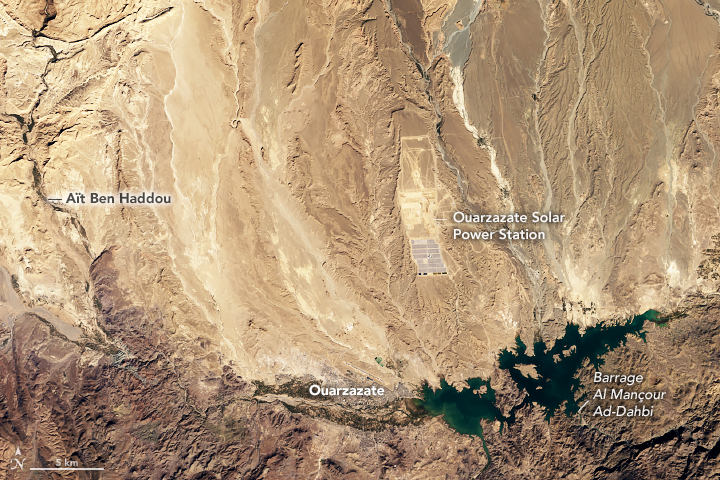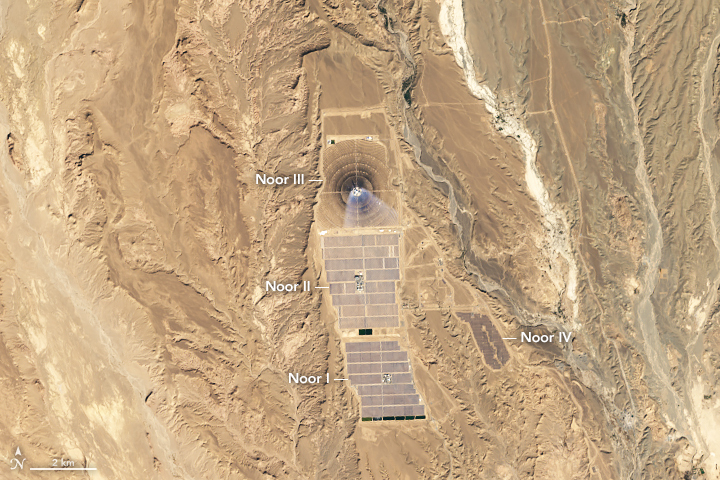
Sunny Days in Morocco’s Ouarzazate Basin
Downloads
- moroccosolar_oli_2015348_lrg.jpg (3032x2177, JPEG)
- moroccosolar_oli_2022351_lrg.jpg (3032x2177, JPEG)
- moroccosolarzm_oli_2022351.jpg (720x480, JPEG)
Metadata
- Sensor(s):
- Landsat 8 - OLI
- Data Date: December 14, 2015 - December 17, 2022
- Visualization Date: March 22, 2023
For centuries, caravan traders used villages in the Ouarzazate basin in Morocco as a stopover on journeys between North Africa and Europe. In recent decades, the entertainment industry discovered the small sedimentary basin flanking the High Atlas and Anti-Atlas mountains and the area has become a center of movie and television production. Most recently, the renewable energy sector has capitalized on the region’s dry, sunny weather by building a large concentrated solar-thermal power plant.
The Operational Land Imager (OLI) on Landsat 8 acquired an image (right) of the plant and the western part of the Ouarzazate basin on December 17, 2022. An image acquired in 2015 image (left) shows the same area when the plant was only partly built.
The Ouarzazate Solar Power Station (also called Noor Power Station), located 10 kilometers (6 miles) northeast of Ouarzazate, has an installed capacity of 582 megawatts. The plant supplies electricity to nearly 2 million Moroccans and prevents emissions equivalent to 1 million metric tons of greenhouse gases per year, according to Moroccan officials.
The complex is divided into four power sections. Noor I, completed in 2015, is made up of thousands of parabolic mirrors that focus sunlight to heat tubes, filled with thermal oil, that run the length of the mirrors. The heated oil is used to make steam that turns a turbine to generate electricity. The thermal oil can also be used to heat molten salts in storage tanks that keep the salt hot enough to generate steam well after sunset.

Noor II, completed in early 2018, uses similar mirrors but has a dry cooling system that significantly reduces the amount of water required to run the system. Noor III, also completed in early 2018, includes 7,400 Sun-tracking mirrors called heliostats that are arrayed in a circular pattern around a tall power tower that heat a molten salt fluid. Noor IV, completed later in 2018, runs on photovoltaic panels, which generate with semiconductors.
Note the lower water level on the reservoir behind the Barrage Al Mançour Ad-Dahbi in December 2022 compared to December 2015. In 2022, this part of Morocco was in the midst of a severe drought. This has made apportioning the region’s scarce water resources between the solar plant, farmers, nearby mines, and urban water users in Ouarzazate and other towns challenging.
Growth and development in Ouarzazate have put additional pressure on natural resources. The city’s population has swollen by more than 80,000 people since the early 1990s, driven in part by economic development associated with the power plant and other industries but also due to the region’s active tourism industry.
One of the main draws for tourists include Ouarzazate’s movie and television industry. The region hosts major studios and has served as the filming location for productions such as Lawrence of Arabia, Gladiator, The Mummy, Game of Thrones, and many others. Another draw is Aït Ben Haddou, a UNESCO World Heritage Site northwest of Ouarzazate that hosts a fortified town built with clay and featuring traditional southern Moroccan architecture.
References
- Al Jazeera (2022, November 11) ‘Preserving oases’: The fight for water by Morocco farmers. Accessed March 22, 2023.
- CNN (2019, July 16) Morocco in the fast lane with world’s largest concentrated solar farm. Accessed March 22, 2023.
- Fares, M.S.B. & Abderafi, S. (2018) Water consumption analysis of Moroccan concentrating solar power station. Accessed March 22, 2023.
- The George Washington University Moroccan Farmers Compete with Solar Complexes for Access to Dwindling Water Resources. Accessed March 22, 2023.
- Key Biodiversity Areas Barrage Al Mansour Ad-Dhabi, Morocco. Accessed March 22, 2023.
- Morocco World News (2020, December 20) The City of Ouarzazate, Morocco: Africa’s Hollywood. Accessed March 22, 2023.
- Morocco World News (2021, February 24) Morocco’s Ouarzazate Noor Solar Plant Supplies 2 Million Moroccans with Electricity. Accessed March 22, 2023.
- NASA Prediction of Worldwide Energy Resources The Power Project. Accessed March 22, 2023.
- National Renewable Energy Lab Concentrating Solar Power Projects in Morocco. Accessed March 22, 2023.
- Power Technology (2020, March 6) Noor Ouarzazate Solar Complex. Accessed March 22, 2023. ?
- Tourism Review (2023, March 6) Morocco’s Airports Reported Increased Air Traffic. Accessed March 22, 2023.
- The World Bank (2015, November 20) Morocco to Make History with First-of-Its-Kind Solar Plant. Accessed March 22, 2023.
- United Nations Ait-Ben-Haddou. Accessed March 22, 2023.
NASA Earth Observatory images by Allison Nussbaum, using Landsat data from the U.S. Geological Survey. Story by Adam Voiland.
This image record originally appeared on the Earth Observatory. Click here to view the full, original record.